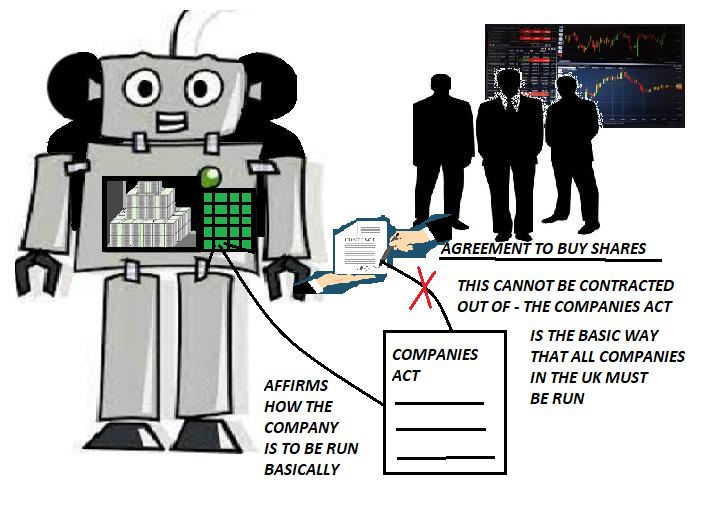Russell v Northern Bank Development Corp Ltd [1992] 1 WLR 588
Citation:Russell v Northern Bank Development Corp Ltd [1992] 1 WLR 588
Rule of thumb:Can a person contract out statutory or regulatory provisions, in particular the Companies Act? No, statutory and regulatory provisions cannot be contracted out of. This case affirmed the principle of ‘the Companies Act as a floor of rights’ that people cannot contract out of.
Background facts:
The facts of this case were that 4 directors and an external shareholder, Northern Bank Development Corporation, all owned shares in Tyrone Brickwork Ltd. 4 of the ‘brickie’ shareholders owned 20 shares each totalling 80 shares, and Northern Bank owned 120 shares – a 60% to the investment bank and 40% to the ‘brickies’ divide in other words. The normal rule of new share creation in company law is that this can generally be done if there is a viable commercial reason for doing so and all of the shareholders are offered the chance to buy these shares without having their shareholding diluted. Amongst themselves, the shareholders in this case contracted out of this default rule of company law for new share creation. They agreed that new shares could not be created for new capital to be injected unless all of the shareholders agreed, and they further agreed that the Company Articles could not be changed by extraordinary resolution either. Northern Bank Development sought to call an extraordinary general meeting where the company articles could be rewritten to allow them to create new shares and seek new investment in the company for commercial expanstion.
Parties argued:
Mr Russell, one of the ‘brickies’ who was a shareholder, was happy with how the company was being run as matters stood. He did not want new shares to be created. He did not his shareholding to be diluted as he could not afford to buy shares with the new share issue to keep his shares at the same level. Russell sought to raise an action to prevent Northern Bank from calling the Extraordinary General Meeting and changing the company shareholding to create new shares for sale to try to get more capital into the company bank account.
Judgment:
The Court held that the term of the Company Articles were a floor of rights that could not be contracted out of – Russell could not stop this new creation of shares from taking place as it was being done in accordance with the default rules of company and he was not allowed to contract out of these. The Court held that Russell could possibly enforce this contract against the other shareholders personally under standard contract law, and potentially seek damages in an action there if he could prove that he had lost out financially because of the changes, but any Articles of Association that tried to contract out of fundamental points of Company law under the Companies Act were not valid terms that could be enforced.

Ratio-decidendi:
‘My Lords while a provision in a company's articles which restricts its statutory power to alter those articles is invalid an agreement dehors the articles between shareholders as to how they shall exercise their voting rights on a resolution is not necessarily so... This was a clear undertaking by T.B.L. in a formal agreement not to exercise its statutory powers for a period which could, certainly on one view of construction, last for as long as one of the parties remained a shareholder. [...] As such an undertaking it is, in my view, as obnoxious as if it had been in the articles of association and therefore is unenforceable as being contrary to the provisions of article 131 of the Companies (Northern Ireland) Order 1986. T.B.L.'s undertaking is, however, independent of and severable from that of the shareholders and there is no reason why the latter should not be enforceable by the shareholders inter se as a personal agreement which in no way fetters T.B.L. in the exercise of its statutory powers’, Lord Jauncey
Warning: This is not professional legal advice. This is not professional legal education advice. Please obtain professional guidance before embarking on any legal course of action. This is just an interpretation of a Judgment by persons of legal insight & varying levels of legal specialism, experience & expertise. Please read the Judgment yourself and form your own interpretation of it with professional assistance.

